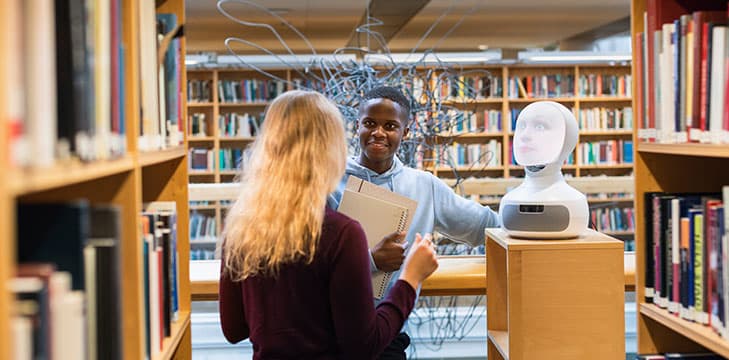Projects
Accessible digital futures
Unlocking the potential for accessible digital and AI technologies in higher education (HE).
Archived
This project was archived on
Length:1 year and 11 months
Expected outcome: Advice

Next steps
The first phase of this project has concluded and next steps are in development. Read about our findings and access the full project report. Keep in touch by joining the ADFHE JiscMail to reflect on findings or receive updates about follow-up activities.
A new opportunity for accessible innovation
New digital and AI technologies are radically transforming all facets of society, including HE where they can foster greater inclusiveness and productivity when created with accessibility in mind.
We believe that the potential of accessible technologies can be a great avenue for the UK on its path to becoming a global leader in digital and AI technologies.
The project has two objectives:
- To examine the opportunities and barriers for innovation and growth of accessible digital and AI technologies in HE. This will result in advice and guidance for key stakeholders in policy, industry and the HE sector
- To deliver a bespoke special events and knowledge-exchange programme, tailored to give key stakeholders practical advice and information on how accessible digital and AI technologies can be integrated into their institutional settings
Accessible technology solutions have the potential to be more than an after-thought or an after-the-fact bolt-on merely to satisfy a legal requirement. Done right, the development and adoption of accessible digital and AI technologies would boost Britain’s productivity, promote its technology industry, and ensure that the UK continues to be one of the most attractive places to study in the world.
Legal and regulatory context
The Equality Act 2010 requires HE to make reasonable adjustments to remove barriers for disabled students and staff. The introduction of the Public Sector Bodies (Web and Mobile Applications) No.2 (2018) Regulations, followed by a sector-wide move to digital delivery during the pandemic beginning in 2020, led to awareness of the importance of accessibility like never before.
The HE sector faces significant challenges in procuring digital and AI-powered tools that meet accessibility standards (as defined in WCAG 2.2 AA), often because suppliers do not fully understand the need for compliant products, information from suppliers is missing, or universities are unsure what information to ask for.
The European Accessibility Act will place more requirements on suppliers to provide products that are accessible, which provides an opportunity to raise awareness of the importance of accessibility with the technology industry.
Despite growing interest in the potential of emergent technologies such as virtual and augmented reality for HE, we lack guidelines on ensuring these are accessible – from the development to procurement stage – and while the potential to create more inclusive experiences is often focused upon, the known barriers to use for disabled people are significant.
In this project, we want to examine what barriers there may be to embedding accessibility in product design and procurement, and what facilitators could lead to improvement.
Opportunities for accessible digital and AI technologies in HE
Digital and AI technologies are rapidly changing HE. We believe that this change provides a golden opportunity for the sector to learn from the advancements that have been made in inclusive design and assistant technologies in HE, making education accessible for all. It is also an opportunity to change those things that are not working.
We want to take full advantage of this moment as HE providers examine and upgrade their digital and AI-driven technological infrastructure to come up with a plan to ensure that this upgrade is responsible, ethical, inclusive, and ensures an accessible environment for students, academics, and staff. We also want to use this moment to promote accessibility as an attractive USP of UK digital products and HE.
The project’s goal is to develop and offer advice and recommendations to be used by policy makers, regulators and the HE sector to:
- Make it easier for HE providers to procure good and responsible accessible digital and AI technology
- Identify and promote the market opportunities for British tech companies to innovate and deliver cutting-edge accessibility products and solutions domestically and abroad
About our partners
The Glenlead Centre delivers high-quality research and policy solutions to legislators, regulators, policymakers, the public and private sectors, and academia. The centre’s impact includes policy recommendations to the US Federal Trade Commission, US Financial Consumer Protection Bureau, European Parliament, and UK Parliament; and a transatlantic regulatory workshop on deceptive design at the Nobel Prize Summit.
With most of the centre researchers holding doctorates from leading universities, they focus on building stakeholder capabilities and capacity for a more equitable and prosperous digital and AI-driven future. Clients include the University of Cambridge and the University of Oxford.
Get involved
Read our workshop reports
We’ve been engaging directly with a diverse range of stakeholders from higher education, industry and policy. Making use of discussion-based workshops with stimulating guest presenters to set the tone, these events have been open to all. Using the Chatham House Rule ensured free flowing and honest discussion of complex topics, including:
- AI, accessibility, and higher education: unlocking the potential
- Accessibility, generative AI, and empowering disabled students
- Accessible procurement: exploring the challenges and identifying collaborative solutions in Scottish higher education
- The European Accessibility Act (EAA): what does it mean for UK higher education providers?
- Accessible AI in HE: building institutional capacity for student-centred approaches to digitally enhanced learning and assessment
Every workshop is followed by a report which summarises content, discussions and recommendations. Find all the workshop reports at The Glenlead Centre's publications.
What others are saying about the project
Insights from Jisc’s accessible digital futures opening event – Learning at City St George's
Accessible digital futures at PICTFOR’s Technology and Community event
Beyond the technology podcast
In this Jisc podcast, accessible digital futures co-chairs Dr Ann Kristin Glenster and Kellie Mote discuss the rationale behind the project and invite Bouquette Kabatepe of Imperial College London to reflect on the benefits of being involved in the project.
Listen to Beyond the Technology: empowering students with better accessibility in digital and AI.
Next steps
Project partner, The Glenlead Centre, is putting the finishing touches to a final report which will inform how we act upon the insights gathered through the project.
For the latest news and events, sign up to the ADFHE JiscMAIL list or join our accessibility and assistive technology communities.
Meet the project team

Dr Ann Kristin Glenster
Executive director, Glenlead Centre
Kellie Mote
Programme lead (accessibility)
Anderona Cole
External relations and public relations officer
Helen Nicholson
AI specialist, Edtech and co-design



